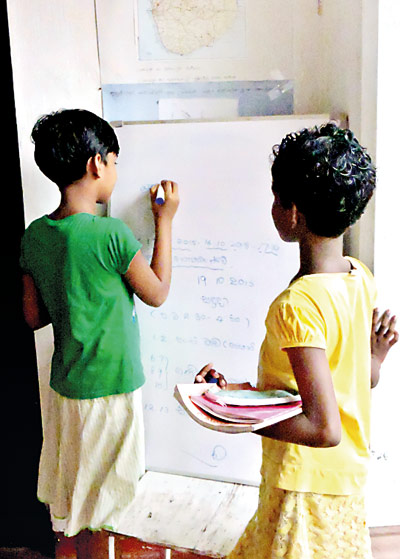Young women with a future – the girls of Sri Lankadhara Balika Home
A lot has changed for women since 1922, but the vision of the late Dr. and Mrs. W. A. de Silva who founded the Sri Lankadhara Balika Home for disadvantaged girls over 90 years ago continues.
\While most of their peers in Colombo are busy rushing from one tuition class to the other, or poring over homework, we are pleasantly surprised to find the girls playing a game of cricket outside when we visit one weekday evening.
This does not mean the girls neglect their studies, in fact, they run by a schedule that allows ample time for study but also insists on an hour of play every day.
In 1922, philanthropists Dr. and Mrs. de Silva saw young destitute girls in Sri Lanka were in need of refuge and donated their home and vast three acre property in Wellawatte for the cause of providing for and educating these girls.
Thus the Balika Home was born. Over time, it has evolved to include a Senior Citizens Home for females over 60 years, a daycare centre for elderly men and women, an Infants Home, and a Pre-School/daycare centre for children.
The Balika Home currently houses about 55 girls ranging from age five to 18, who are all referred to the home by the Department of Probation and Childcare and Juvenile Courts.
“Some of these children are orphans, or their parents are unable to take care of them,” says President of the Sri Lankadhara Society, Kanthi Amarasinghe. “They are all traumatised in some way or other and some are victims of abuse.”
Chitra Udyanagani, 14, has been here since the age of three and is completely at home in her surroundings. Chitra is a talented dancer and a promising student, who says, “I look up to our akkas, they are my good friends.”
“When they are young, like all children, they can be a little selfish and fight but as they get older they become peaceful and more united,” says educational coordinator, Mrs. Srimathi Vidyalankara. “When we reproach one girl, the others’ faces also turn sour – I’ve noticed that a lot.”
Seventeen-year-old D. P. Priyadarshani has hopes of going to university and studying “something to do with technology,” while eighteen-year-old G. M. Sathsarani, also aspiring to enter university, wants to work in media.
After completing their A/Ls, both girls will soon leave the home, but tell us they aren’t intimidated by the prospect. While security is sometimes a concern, they are confident they will be able to survive independently.
Following founder president, Mrs. Catherine de Silva, the home has passed through the hands of several notable women such as Senator Cissy Cooray and Mrs. N. S. C. Perera, both active social workers, and successive presidents and committee members (all voluntary) who have worked tirelessly for the welfare of the home and its residents.
“The reason our lives today are so beautiful is because of the compassion of everyone here and what they have taught us.
We learnt from them how we should conduct ourselves and behave in society when we leave the home,” says W. Anusha Dilrukshi. It’s been four years since Anusha left, but she still maintains close ties with the home and visits often.
“The women associated with this home serve the poor. I mean, we’re here because of things like financial problems and, in caring for us; they have become our role models. Some day, we will become independent and help poor people like us as well,” says Priyadarshani.
After the warmth of the home, S. Priyangika says life outside was a big change. “It was difficult being alone at first, but you get used to it with time.”
Both Anusha and Priyangika think thriving independently in our society is a challenge for most young people and not just women, but feel the home has prepared them well.
Receiving skills training in sewing and cookery, they say, was especially helpful. It helped Anusha secure her first job as a machine operator and Priyangika noticed she had an advantage over some of her peers when it came to living by herself.
Every year the girls are also taken on an excursion and they talk happily about their latest trip to Polonnaruwa. “It was equally educational and fun,” says Sathsarani.
“We pay special attention to the girls’ psychological wellbeing,” says Mrs. Amarasinghe. “We have counsellors and well trained staff, but it is very difficult to find new, dedicated staff. We have to limit the number of girls we can take in because of this.”
Although the society receives a small stipend from the Government, they depend mostly on donations to keep the home and its many services running. “This building is over 90 years old, so maintenance and upkeep is also very costly,” says Mrs. Amarasinghe.
In the end, these girls are hardly any different from others their age – the little ones want us to play with them longer, while the older ones hang back shyly.
What distinguishes them, perhaps, is a humble and good humoured attitude most of them show in their interactions with their mentors and each other.
As Anusha says, “we are loved, respected and know that, even after we leave, there is some place we belong.”
| Sing-along fundraiser To raise funds for the home, the Sri Lankadhara Society has organised a sing-along and dinner with Sohan & The Experiments on November 28 at the Ramada Colombo hotel from 7 p.m. onwards. Tickets are available at the home, or call Lani on 0773106185 or Sepalika on 0773355361. Anyone interested can visit the Sri Lankadhara Home at 95, W. A. de Silva Mawatha, Wellawatte, or http://www.srilankadhara.org/ to make a donation. |


